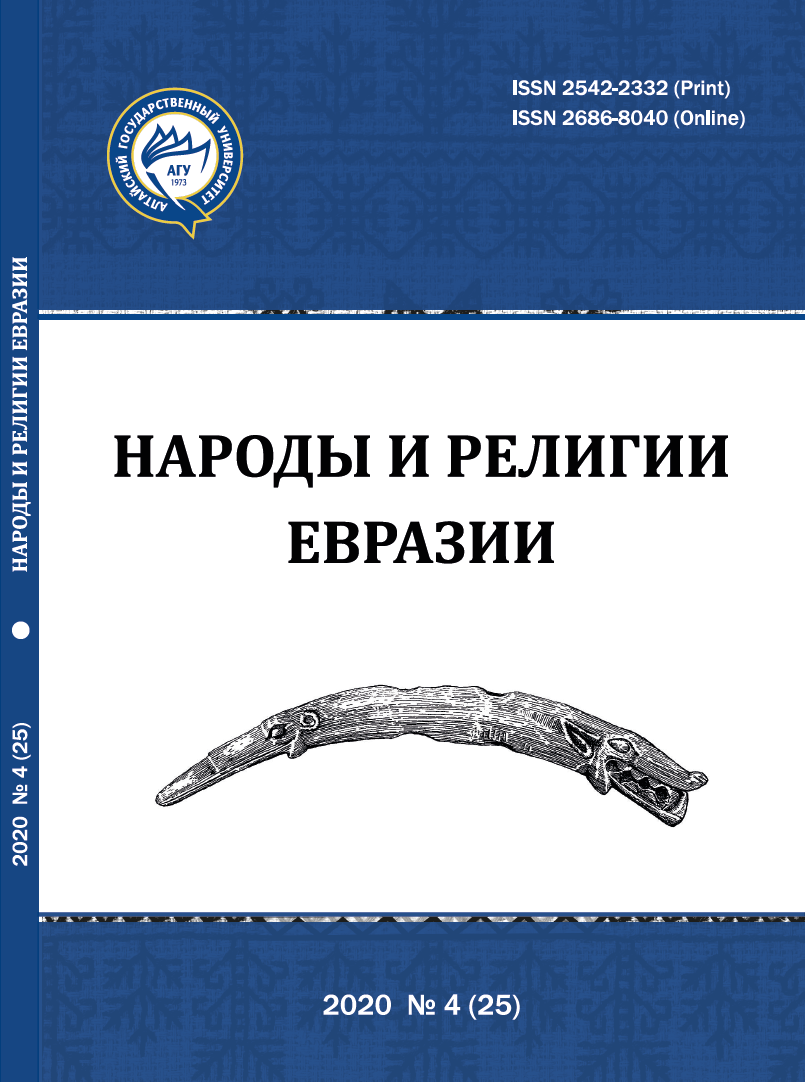"Emancipation" of muslim women in Central Asia: strategies of resistance and ways of adaptation (1920s-1930s)
Main Article Content
Abstract
The emancipation of Muslim women in Central Asia was one of the most ambitious and yet one of the most challenging tasks that the Bolsheviks in the region have attempted to address. Changes in this area started earlier. The Russian imperial administration in Turkestan and the Jadids discussed and sometimes tried to implement measures that would promote women's emancipation in the previous period of the region's history. The efforts of the Bolsheviks should be seen in the light of this experience. Nevertheless, the campaign for the emancipation of Muslim women, which was launched by the Bolsheviks, was unprecedented if we evaluate it from the point of view of the goals set, the ways of their implementation and the resources mobilized for this. This campaign met with powerful resistance not only in social groups that were initially seen as hostile to the new government, but an ambiguous and often negative reaction from those forces that were, or at least could be considered its supporters. Faced with the inability kept apart from a large-scale social experiment, some people sought to develop practices for adapting to current policies, while others looked for ways to resist it. However, there was no impassable border between resistance and adaptation. And the first and second were extremely diverse, changed in time and depended on many factors. Between the two poles — active resistance and active support — there were many intermediate forms that often eluded attention of researchers.
Downloads
Metrics
Article Details

This work is licensed under a Creative Commons Attribution 4.0 International License.
References
Адамс Л. Применима ли колониальная теория к Центральной Евразии? // Неприкосновенный запас. 2009. № 4. С. 25-36.
Ислам и советское государство: Вып. 1: По материалам Восточного отд. ОГПУ 1926 г. / вступ. ст., сост. и коммент. Д. Ю. Арапова и Г. Г. Косача. М. : Изд. дом Марджани, 2010. 152 с.
Вагабов М. В. Ислам и женщина. М. : Мысль, 1968. 230 с.
Великий Октябрь и раскрепощение женщин Средней Азии и Казахстана (19171936 гг.) : сборник документов и материалов. М. : Мысль, 1971. 463 с.
Волков В. В. Государство, или Цена порядка. СПб. : Изд-во Европейского ун-та в Санкт-Петербурге, 2018. 160 с.
Государственный архив Российской Федерации. Ф. Р3316. Оп. 28. Д. 628.
Градскова Ю. Свобода как принуждение? Советское наступление на «закрепощение женщины» и наследие империи (середина 1920 — начало 1930-х гг., Волго-Уральский регион) // Ab Imperio. 2013 (4). C. 113-144.
Зубковская О. Постколониальная теория в анализе постсоветского феминизма: Дилеммы применения // Ab Imperio. 2007 (1). С. 395-420.
Кузнецова С. И., Нортроп Д. Империя под паранджой: гендер и власть в сталинской Центральной Азии. Northrop D. Veiled Empire: Gender and Power in Stalinist Central Asia. Ithaca, NY: Cornell University Press, 2004. — XVII, 392 p. // Социальные и гуманитарные науки. Отечественная и зарубежная литература. Серия 9: Востоковедение и африканистика. 2007. № 1. С. 102-109.
Кузнецова С. Пионервожатый женился на пионерке // Коммерсантъ Власть. № 15 (869). 2010. С. 56-60.
Лысенко Ю. А. Механизмы формирования социальной базы большевизма в Степном крае в период Гражданской войны (1918-1921 гг.) // Society and Security Insights. 2019. 2 (3). С. 185-192.
Мартин Т. Империя «положительной деятельности». Нации и национализм в СССР, 1923-1939 / пер. с англ. О. Р. Щёлоковой. М. : РОССПЭН, 2011. 855 с.
Нортроп Д. Ограниченное освобождение: гендер, революция и паранджа в повседневной жизни в Советском Узбекистане. URL: https://caa-network.org/archives/8785 (дата обращения: 20.04.2020).
Российский государственный архив социально-политической истории. Ф. 17. Оп. 114. Д. 734. Ф. 17. Оп. 10. Д. 441. Ф. 121. Оп. 2. Д. 36. Ф.62. Оп. 2. Д. 95.
Скотт Дж. Благими намерениями государства. Почему и как проваливались проекты улучшения условий человеческой жизни / пер. с англ. Э. Н. Гусинского, Ю. И. Турчаниновой. М. : Университетская книга, 2005. 401 с.
Тлостанова М. В. Деколониальные гендерные эпистемологии. М. : ООО ИПЦ «Маска», 2009. 386 с.
Badran M. Competing agenda: Feminists, Islam and the state in nineteenth- and twentieth century Egypt. In: Kandiyoti D(ed.) Women, Islam, and the State. Philadelphia: Temple University Press, 1991. S. 201-236 (на англ. яз.).
Edgar A. Bolshevism, Patriarchy and the Nation: The Soviet 'Emancipation of Muslim Women in Pan-Islamic Perspective // Slavic Review, 2006. 65 (2): 252-272 (на англ. яз.).
Kamp M. Women's Studies and Gender Studies in Central Asia: Are We Talking to One Another // Central Eurasian Studies Review. 2009. Vol. 8.1. P. 2-13 (на англ. яз.).
Kandiyoti D. The politics of gender and the Soviet paradox: Neither colonized, nor modern? // Central Asian Survey. 2007. 26 (4): 601-623 (на англ. яз.).
Kandiyoti D. Post-Colonialism Compared: Potentials and Limitations in the Middle East and Central Asia // International Journal of Middle Eastern Studies. 2002. Vol. 34. № 2. P. 279297 (на англ. яз.).
Kane D., Gorbenko K. Colonial legacy and gender inequality in Uzbekistan // Current Sociology. Sep 2016, Vol. 64 Issue 5, P. 718-735 (на англ. яз.).
Keller S. Trapped between State and Society: Women's Liberation and Islam in Soviet Uzbekistan, 1926-1941 // Journal of Women's History. Spring 1998. Vol. 10. Number 1, P. 2044 (на англ. яз.).
Massell Gregory J. The Surrogate Proletariat: Moslem Women And Revolutionary Strategies In Soviet Central Asia, 1919-1929. Princeton: Princeton University Press, 1974. xxxvi, 448 pp. (на англ. яз.).
Northrop D. Subaltern Dialogues: Subversion and Resistance in Soviet Uzbek Family Law // Slavic Review. 2001. 60 (1) 115-139 (на англ. яз.).
Northrop D. Veiled Empire: Gender and Power in Stalinist Central Asia. Ithaca, N. Y.: Cornell University Press, 2004 (на англ. яз.).

